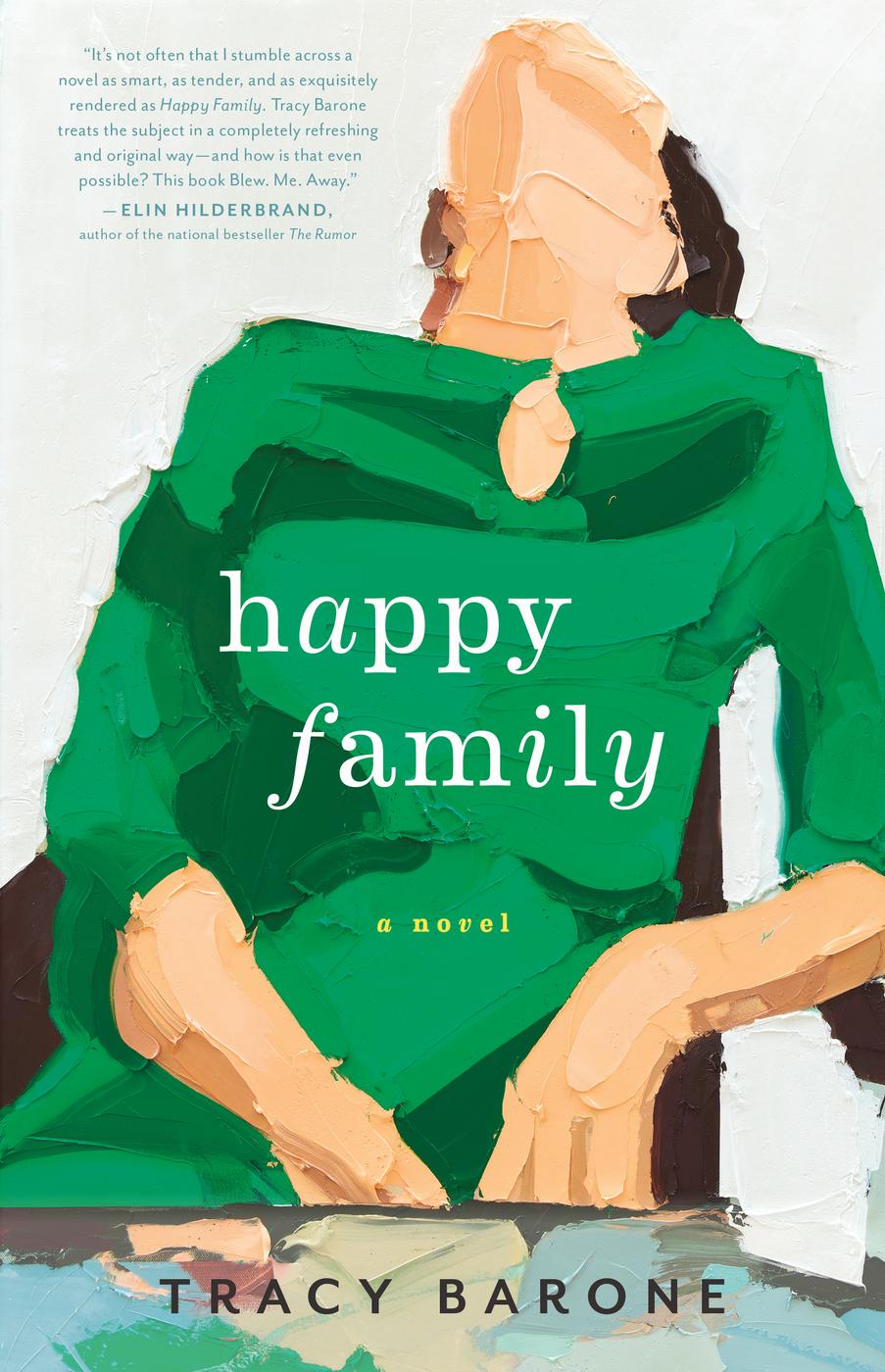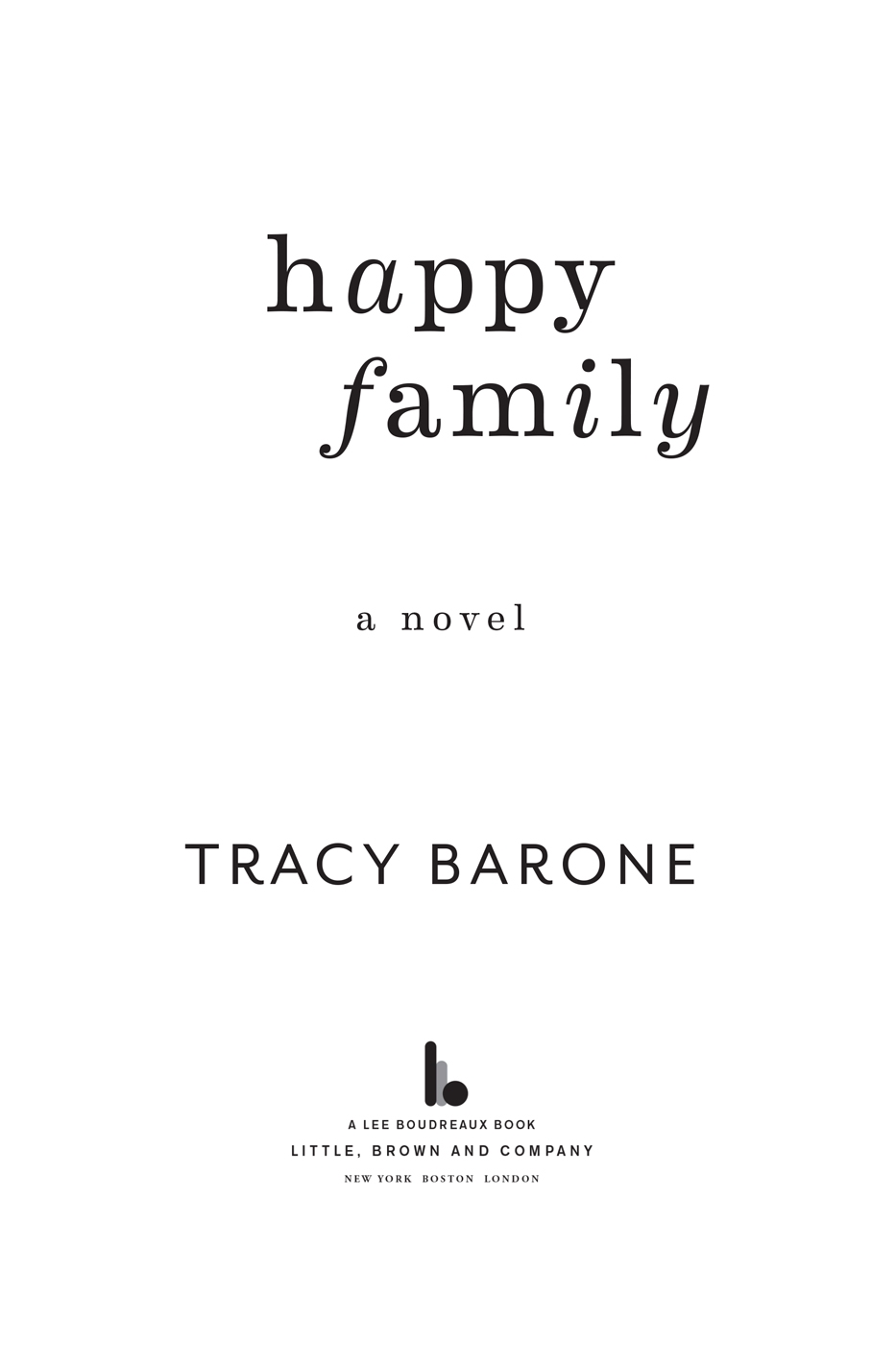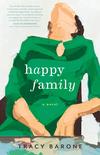Happy Family
Authors: Tracy Barone




Hachette Book Group supports the right to free expression and the value of copyright. The purpose of copyright is to encourage writers and artists to produce the creative works that enrich our culture.
The scanning, uploading, and distribution of this book without permission is a theft of the author's intellectual property. If you would like permission to use material from the book (other than for review purposes), please contact [email protected]. Thank you for your support of the author's rights.
For Zoë Anne
Â
Â
Â
Â
Happy families are all alike; every unhappy family is unhappy in its own way.
âLeo Tolstoy,
Anna Karenina
Marilyn Monroe found dead, drug overdose
Jamaica celebrates independence
Nelson Mandela arrested for illegally leaving South Africa
Trenton, New Jersey: Generator blowout at St. Mercy's
Twelve-car pileup on the New Jersey Turnpike, worst in state's history
T
he pregnant girl enters the Trenton Family Clinic, looking like she parted the Red Sea to get there. The lower half of her dress is wet with amniotic fluid, and the upper half is streaked with sweat. She stands, shifting her weight from foot to foot, in the waiting room near the check-in window. She breathes in quick, sharp breaths; no identification, no insurance card. The entire contents of her plastic purse: one dollar and thirty-nine cents, half a roll of Necco wafers, a chewed pencil, and a hand-shaped pendant with an eye in its center. She's sixteen or seventeen, with white-white skin and black hair. She smells like tobacco and spices that don't come in tins at the Stop and Shop. A jolt of pain makes her feel like her flesh is being stripped from her bones. “Hey.” She pants, gripping the ledge of the window. “Hey, somebody.”
The somebodies around don't have white coats, caps, or name tags. They sit or stand, pressing towels to wounds, looking dazed or scared. An elderly man wearing a janitor's uniform strains first to pull, then to push a fat man off a chair and onto a gurney. The man has lost a shoe, has blood spatter on his pants. During one attempt, the janitor tips into the gurney, sending it caroming into a wall.
“Nurse?” the girl asks.
On a regular day, the nurses wouldn't have been in a rush to help this girl. They see poor kids like her all the timeâalthough they're not white, not in this neighborhood. But this is not a regular day. It's a short-straw Sunday, and the majority of the clinic staff are off; they're in movie theaters or dipping their feet in water, anywhere to get out of the record-breaking August heat. The nurses and lone doctor on duty are in the back, overwhelmed with trauma patientsâvictims of a highway collisionâwho, due to a generator failure at St. Mercy General, have been routed to the clinic because it's the only medical facility within miles.
The girl feels faint. The only fan stopped working long ago, and the air is close and thick with the rust smell of blood, bleach, and something nasty somebody's just thrown up all over the floor. A teenage orderly slops over with a bucket and mop and swipes at the vomit, which streaks close to the girl's bare feet. She squeezes closer to the window just in time for another pain, this one sharper, longer, harder to endure. The orderly's eyes dart from the floor to the girl. He can see the dark rings of her areolas through the thin fabric of her dress. The girl moans and the boy quickly looks down.
“Orderly!” A nurse with a name tag that reads
Syl
sticks her head into the waiting room, points at the kid, and then disappears. He looks upâ
What, me?
âand his left hand involuntarily starts curling as if around an imaginary ball. The girl closes her eyes and sees floating specks of orange and gold.
When the girl's contraction has subsided, the orderly and the janitor are gone. She waits. She walks, she sits on her heels, she breathes and forgets to breathe; she waits for the next pain to come, then waits for it to go away. She waitsâit could be minutes or hoursâuntil she feels a nurse's fleshy arms around her, pulling her to a standing position. “Come on, you can walk. Just around the corner.”
Just around the corner is one big room sectioned into cubicles by curtains. All of the cubicles are full of what the nurse calls “real emergencies.”
“Wait here,” Syl says, trotting off.
The girl is left standing. Movement had blunted the pain for a few seconds, but her next contraction is so intense she bites the inside of her cheek until she tastes blood. Between ragged breathsâshe's already determined that calling for help will do no goodâshe focuses on the little tables next to each patient's cubicle. On the tables are pink, kidney-shaped trays filled with bottles of medications, pills in paper cups. No one is paying attention to her. The nurses' station is untended. The girl moves toward a table parked beside the bed of an unconscious person with a surgical mask over his or her face. In one quick movement, she swipes a syringe and two bottles identified with a typed strip that says
Morphine
. Her hand shakes from the aftershock of labor pains, but she'd shoot up right there if it weren't for Syl's returning.
Syl is nothing if not efficient; she's converted a corner next to the bathroom into a birthing station and an IV awaits. Within minutes, she's got the girl hooked up and lying on a cot, covered with a paper sheet. Syl feels around inside the girl to see how dilated she is. The girl clenches the vials in her hand so hard her fingernails bite into her palm.
“No time to put you out,” Syl says into the chasm of the girl's open vagina. And the nurse is off to retrieve something, a doctor perhaps.
I'm going out, all right,
the girl thinks as she plunges the syringe into the first bottle of morphine. She's on a first-name basis with Dilaudid, Nembutal, chloral hydrate, opium smoked from a hookah in Chinatown. She taps the side to make sure there are no air bubbles and sticks it in the feed to her IV line. As the girl feels the first gold filigree spread its fingers through her body, she thinks she is lucky. Lucky to be in the last bed in this, her Last Resort.
Syl's back, lifting something wet from underneath the girl. She barks at the orderly, who has suddenly materialized. The girl doesn't care. She's warm and open, lying in the sun. She squints a little from the heat, then closes her eyes again. “Doctor's coming,” Syl says. To the girl, everything sounds like it's underwater. Maybe she's floating on her back in the ocean and her ears have dipped below the surface. She is aware of friction in her womb and the need to bear down and push. And yet the pain is hovering above her, outside her body.
“Don't bear down. Hold on for the doctor,” Syl says.
The girl is laughing because the baby is popping out. She hoists herself up on her elbows and sees a white-crusted head, the neck still inside of her.
“Don't bear down!” Syl insists. As if the girl had any control. As if she could stop the head from opening its eyes, locking onto her. The doctor appears in bloodied scrubs, but with one push, the baby flops out like a bass. “Girl,” Syl says. She already knows that because the baby's speaking to her in thoughts no one else can hear.
I am here to love you, Miriam,
the newborn says. At the sound of her name, Miriam starts to cry.
Before, Miriam couldn't feel connected to another person, even when their bodies were fused and melting into each other. Having a man inside of her, lying stomach to stomach, thigh to thigh, forehead to forehead, she felt only the nothingness of herself. She yearned to be filled, yet when somebody was inside her, she wanted only to escape. Now, as she and her baby are separate yet still one, united by the cord that still joins them, Miriam understands the ecstasy of connectedness. Her thoughts and the baby's thoughts flow through the cord effortlessly. Miriam pictures herself, eyes ringed with kohl, standing in front of the sea in the blue dress her mother made her. She holds the baby up to the sky like an offering. Miriam is breathing in her child's sweet, sweet breath and listening to her words.
We'll fly to bliss,
she says, and her baby carries them up and into the clouds.
But her baby is being taken away. The doctor has cut the cord with his scissors and has given the crying infant to Syl to take someplace to weigh and measure and clean.
Miriam is shivering so badly she thinks she'll fall off the gurney. She's alone and her body aches and is so cold. She wishes she had a blanket. She tries to go back to the blue dress, the seaâbut they are only thoughts. She still has the other little bottle; she'd meant to save it, but she can't wait, she's shaking with cold and can't feel her lips. She'll have to worry about later later; she needs it now.
Whhhhhhssshhhhh
âthe liquid is hot in her veins and she hears the
blip
of someone else's machine. She can wriggle her toes and feel the sun, just like the one on the postcard from the Jersey Shoreâthe one she'd sent to that nice man after she'd found out he'd made her pregnant. She didn't know why she felt the need to go south; maybe she was a confused bird, or because after they'd make love he'd cry in her hair and call her his treasure. What was his name again? Something with a
J,
like Jesse or James or Jerry. He'd let her stay with him and didn't ask her where she was going and when she'd be back. He'd stroke her hair and make her something with potato chips and soup from a can. And he made this baby. How could she tell him that opium is beyond sex? All she wanted was to suck the white dove of smoke out from under a glass and then eat a chocolate bar. What is she supposed to do with a baby? She's never had a pet, though she likes turtles. She keeps losing herself, how can she hold on to someone else? She feels no pain now, but she knows it is coming, that she has only so long before she's in worse pain than when she was in labor and there will be no more little bottles or nice Jerrys.
Miriam knows her baby is safe. She's being wrapped up in a soft blanket and the nurse is washing her and kissing her head like in a baby-shampoo commercial.
Miriam thinks of the child in
The Red Balloon
. It's the only movie she's ever seen, wearing kneesocks, eating sticky toffee, and drinking soda pop that made her burp out of her nose. No matter that the man she was with pushed his hand between her legs during the best part. She doesn't care about any of that because it's so nice lying hereâjust one more moment with heavy lids, driftingâone, two, three, four, let's walk out the door. Five, six, seven, eight, get up now before it's too late.
Miriam sits up and takes the saline bag off its hook. Nobody has come, nobody is watching. She keeps the IV in her arm and puts the tubing and the bag under her dress. She was supposed to remember to do something. What was it? She wanted to write something down. She looks around and finds her purse, fishes for her pencil. She smooths down a semiclean part of her crushed paper sheet and writes what she thinks is the father's full name and where he lives. Then she picks up her purse and, as an afterthought, pulls out the hand pendantâit should protect her baby now. She places it on the sheet next to Jerry's name and walks out of the clinic. Nobody notices. Nobody except the teenage boy who leans on his mop, watching her disappear into the hot blast of day.
